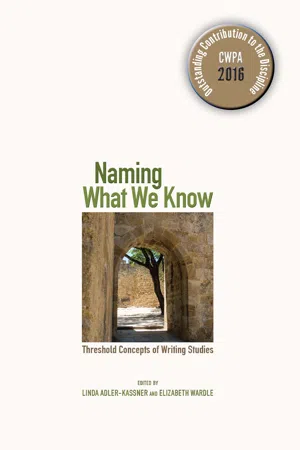
Naming What We Know
Threshold Concepts of Writing Studies
- English
- ePUB (mobile friendly)
- Available on iOS & Android
About this book
Naming What We Know examines the core principles of knowledge in the discipline of writing studies using the lens of "threshold concepts"—concepts that are critical for epistemological participation in a discipline. The first part of the book defines and describes thirty-seven threshold concepts of the discipline in entries written by some of the field's most active researchers and teachers, all of whom participated in a collaborative wiki discussion guided by the editors. These entries are clear and accessible, written for an audience of writing scholars, students, and colleagues in other disciplines and policy makers outside the academy. Contributors describe the conceptual background of the field and the principles that run throughout practice, whether in research, teaching, assessment, or public work around writing. Chapters in the second part of the book describe the benefits and challenges of using threshold concepts in specific sites—first-year writing programs, WAC/WID programs, writing centers, writing majors—and for professional development to present this framework in action.
Naming What We Know opens a dialogue about the concepts that writing scholars and teachers agree are critical and about why those concepts should and do matter to people outside the field.
Frequently asked questions
- Essential is ideal for learners and professionals who enjoy exploring a wide range of subjects. Access the Essential Library with 800,000+ trusted titles and best-sellers across business, personal growth, and the humanities. Includes unlimited reading time and Standard Read Aloud voice.
- Complete: Perfect for advanced learners and researchers needing full, unrestricted access. Unlock 1.4M+ books across hundreds of subjects, including academic and specialized titles. The Complete Plan also includes advanced features like Premium Read Aloud and Research Assistant.
Please note we cannot support devices running on iOS 13 and Android 7 or earlier. Learn more about using the app.
Information
Part 1
Threshold Concepts of Writing
Metaconcept
Concept 1
1.0
Writing Is a Social and Rhetorical Activity
Table of contents
- Cover
- Contents
- Preface
- Acknowledgments
- Introduction: Coming to Terms: Composition/Rhetoric, Threshold Concepts, and a Disciplinary Core
- Naming What We Know: The Project of this Book
- Part 1: Threshold Concepts of Writing
- Concept 1: Writing Is a Social and Rhetorical Activity
- Concept 2: Writing Speaks to Situations through Recognizable Forms
- Concept 3: Writing Enacts and Creates Identities and Ideologies
- Concept 4: All Writers Have More to Learn
- Concept 5: Writing Is (Also Always) a Cognitive Activity
- Part 2: Using Threshold Concepts
- Using Threshold Concepts in Program and Curriculum Design
- 6 Threshold Concepts and Student Learning Outcomes
- 7 Threshold Concepts in First-Year Composition
- 8 Using Threshold Concepts to Inform Writing and Rhetoric Undergraduate Majors
- 9 Threshold Concepts in Rhetoric and Composition Doctoral Education
- Enacting Threshold Concepts of Writing across the University
- 10 Threshold Concepts at the Crossroads
- 11 Threshold Concepts in the Writing Center: Scaffolding the Development of Tutor Expertise
- 12 Extending the Invitation: Threshold Concepts, Professional Development, and Outreach
- 13 Crossing Thresholds: What’s to Know about Writing across the Curriculum
- About the Authors
- Index